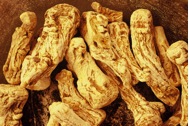
Women’s Health
Women’s health issues are commonly thought of as isolated conditions, without connection to the rest of the body, and conventional treatments often reflect as such. For example, heavy periods can lead to surgical removal of a uterus, and menopausal symptoms are treated with antidepressants or hormone replacement therapy.
Very rarely is a woman asked the question, “How are these symptoms a reflection of your overall physical health and mental state?” We ask that question at MHS, where gynecological issues provide a window into a woman’s general well-being.
We incorporate mind and body in diagnosis and treatment of women’s issues, with great success in achieving health for the whole person. Here we list two commonly-seen examples.
Polycystic Ovarian Syndrome (PCOS) is characterized by lack of mature follicle development in the ovaries, irregular or no ovulation and periods, infertility, excessive growth of facial and body hair, and weight gain. PCOS is caused by insulin resistance. Conventional medicine manages PCOS symptoms with diabetes medications or the birth control pill.
Applying our understanding of the underlying physiology, our treatment approach for PCOS successfully reduces insulin resistance, promotes weight loss, regulates periods and ovulation, and improves fertility.
Endometriosis is growth of uterine (endometrial) tissue outside of the uterus, often leading to pelvic pain, abdominal adhesions, very heavy periods, and may be implicated in infertility. Conventional treatments include hormonal therapies, pain relievers, and surgical removal of extra-uterine endometrial tissue.
Our treatments support the normalization of endometrial tissue, rebalance circulation, alleviate pain, and promote fertility.
For the above and most other women’s health issues, we employ 3 main treatment strategies: 
Acupuncture to promote healthy circulation patterns, balance the immune system, decrease the stress response, and alleviate pain;
Dietary counseling with a focus on nutrient-dense foods that provide optimal reproductive and overall health;
Herbal and nutritional supplementation to balance hormones, regulate menstrual cycles, stabilize blood sugars, and enhance mental-emotional well-being.
Common Women’s Health Conditions Treated at MHS:
Preconception / fertility Acupuncture to enhance IVF outcomes
Miscarriage Prevention
Prenatal / Postpartum conditions
Labor preparation
Lactation support
Anovulation (absence of ovulation)
Amenorrhea (absence of periods)
Dysmenorrhea (painful periods)
Endometriosis
Normalizing cycles after stopping hormonal contraceptives
Premenstrual syndrome
PCOS / irregular cycles
Ovarian cysts
Uterine fibroids
Fibrocystic breasts
… And many, many more.
References:
1. Ternov K, et al. Pain relief during Labor. Analgesic use less in Acupuncture group vs Standard care group: Acupunct Electrother Res. 1998;23(1):19-26]
2. de Aloysio D, Penacchioni P. Morning sickness control in early pregnancy by Neiguan point acupressure. Obstetrics and Gynecology 1992;80:852-854.
3. Belluomini J, et al. Acupressure for nausea and vomiting of pregnancy: a randomized, blinded study. Obstetrics and Gynecology 1994;84:245-248.
4. Riordan J, Nichols F: A descriptive study of lactation mastitis in long-term breastfeeding women. Journal of Human Lactation 6:53-8, 1990
5. Walker EM, Rodriguez AI, Kohn B, et al. Acupuncture Versus Venlafaxine for the Management of Vasomotor Symptoms in Patients With Hormone Receptor–Positive Breast Cancer: A Randomized Controlled Trial. J Clinic Oncology, 10.1200/JCO.2009.23.5150.
6. Singh BB, Berman BM, Simpson RL, Annechild A: Incidence of premenstrual syndrome and remedy usage – a national probability sample study. Alternative Therapies in Health and Medicine 1998; 4:75-79.
7. Oleson T, Flocco W: Randomized controlled study of premenstrual symptoms treated with ear, hand, and foot reflexology. Obstetrics and Gynecology 1993; 82:906-911.
8. Helms JM: Acupuncture for the management of primary dysmenorrhea. Obstetrics and Gynecology 1987; 69:51-56.
9. Lewers D, Clelland JA, Jackson JR, Varner RE, Bergman J: Transcutaneous electrical nerve stimulation in the relief of primary dysmenorrhea. Physical Therapy 1989; 69:3-9.
10. Steinberger A: The treatment of dysmenorrhea by acupuncture. American Journal of Chinese Medicine 1981; 9:57-60.


